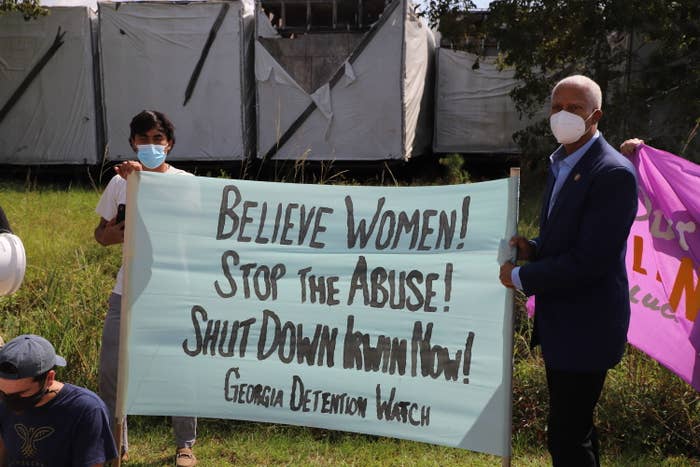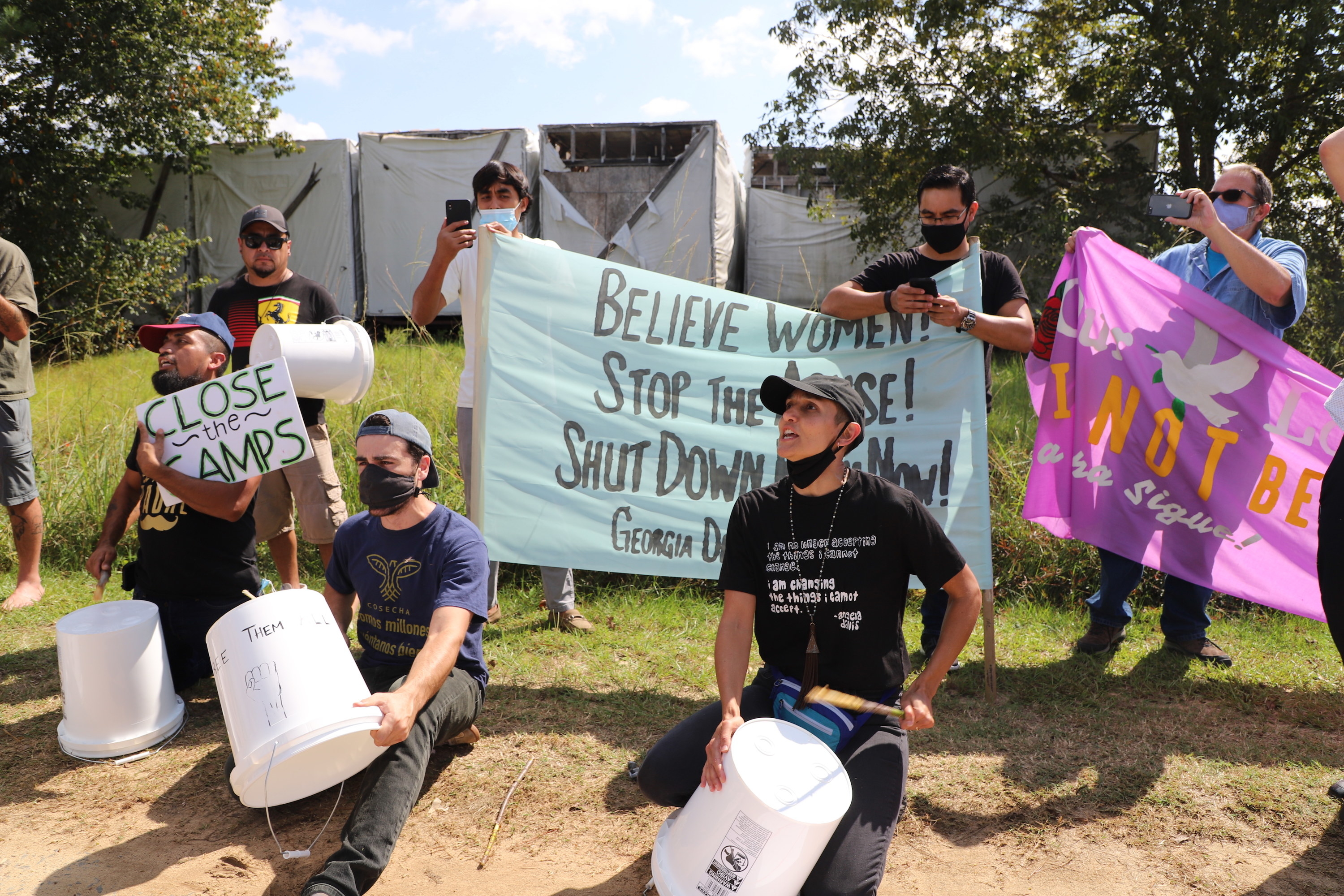
Just weeks after massive public outcry over accusations of poor medical care and unwanted gynecological procedures at a Georgia immigration detention facility, women detainees said little has changed and they're facing retaliation for speaking out.
Early Saturday, Yenifer Moya-Lopez, an immigrant detained at Immigration and Customs Enforcement's (ICE) Irwin County Detention Center, started to have trouble breathing. It wasn't the first time this had happened: For months since being sent to the facility in Ocilla, Georgia, in late June, Moya-Lopez has been filing medical requests to have her breathing issues assessed. The 25-year-old from the Dominican Republic had previously been diagnosed with asthma and told she needed an albuterol inhaler, but didn't receive it.
Moya-Lopez, who started to also get a headache and struggled to get enough air, asked one of the women to hold some VapoRub under her nose to see if it would help her breathe. But she kept getting worse and the women detained with her called for medical aid. A nurse arrived about 15 minutes later and told Moya-Lopez she was having a panic attack. Moya-Lopez insisted she wasn’t and could barely breathe. On the way to the infirmary, Moya-Lopez said she fainted and woke up hooked up to an oxygen mask.
"How can they tell me I'm having an emotional attack?" Moya-Lopez told BuzzFeed News. "I thought I was going to die."
ICE did not immediately return a request for comment.
Immigrants and advocates said it's not unusual for medical requests and treatment to be ignored at the Irwin County Detention Center, a common complaint at other ICE facilities across the US. Moya-Lopez and other detained women hoped the increased attention to the facility would result in conditions improving, but they largely remain the same, including the threat of solitary confinement as punishment.
In September, a whistleblower filed a complaint with the Department of Homeland Security's Office of Inspector General against the facility for poor medical care and COVID-19 testing. Dawn Wooten, who worked as a nurse inside the detention center, alleged unwanted hysterectomies were being performed on immigrant women. The complaint was filed on Wooten's behalf by the Atlanta-based advocacy organization Project South.
So far, there has been no evidence to support the accusations of mass sterilizations on immigrants at the ICE detention center. But several people have since come forward to accuse gynecologist Mahendra Amin of conducting gynecological procedures on women without their consent. The New York Times also reported that some of the procedures might not have been medically necessary. Immigrant women at the facility are no longer being seen by Amin.
The accusation was met with outrage and disbelief, in part because advocates working with people in detention said it was difficult to get ICE to give immigrants basic medical care let alone costly procedures.

Azadeh Shahshahani, legal and advocacy director at Project South, had been going to the facility since 2012. Medical care, including prenatal and reproductive healthcare, had been lacking since then, Shahshahani said. At one point women weren't being given clean underwear, which resulted in detainees getting rashes and infections, she added.
"It just didn't register as a concern," Shahshahani told BuzzFeed News.
A 2017 report on Irwin County Detention Center that used research from Project South found that wait times to receive medical care could be between two days to two weeks. Some immigrants said their medical conditions were left untreated. A man from Nigeria said he had lumps in his chest that started to secrete blood.
"When I requested medical care, sometimes no one would reply. I was not given medical care until ICE later approved it," the Nigerian man told the report's authors. "When I reached out for medical help, I was placed in solitary confinement."
Medical isolation is the same as solitary confinement, Shahshahani said, and immigrants fear being sent there. Shahshahani worries the attention and outrage surrounding Irwin County Detention Center will die down and conditions will remain the same.
"Some members of Congress are calling for this facility to be shut down and it cannot come soon enough," she said.

New York Rep. Adriano Espaillat was part of a congressional delegation that traveled to Irwin County Detention Center to meet with women detained there. In addition to the concerns about Amin, the women told Espaillat their medical concerns were often ignored and were worried about being placed in solitary confinement for speaking out.
"There seems to be a major retaliation effort at Irwin against women who speak up, seek medical treatment, and access to their medical records," Espaillat told BuzzFeed News. "There seems to be an effort to silence them."
The threat of solitary confinement looms large over the women at the Irwin County Detention Center.
"One of the women pleaded with us to protect them, they're really afraid," Espaillat said.
When Moya-Lopez was really sick this past Saturday, another woman tried to call an advocate at 3 a.m., but a guard hung up the phone. The guard then recorded her ID number and threatened her with solitary confinement, Moya-Lopez said.
Solitary confinement has been described by three women detained at Irwin as small, with thin mattresses, and no contact with the outside world. Moya-Lopez said they are told to drink water from the sink.
A Democrat-led report from Congress published in September found that people detained by ICE are often given deficient medical care and that detention centers use segregation as a threat against immigrants. Immigrants interviewed for the report said that ICE guards frequently used segregation to threaten or retaliate against them for actions like submitting too many medical requests or participating in a hunger strike.
This past spring, a group of women recorded a video posted online complaining about the conditions at Irwin County Detention Center and their fears of contracting the coronavirus due to a lack of PPE and social distancing. After they posted the video, the women were put in solitary confinement for several days, Shahshahani of Project South said.
Shortly after waking up after collapsing on Saturday, Moya-Lopez said she was told by medical staff at the Irwin County Detention Center through a guard translating that she was going to be placed in medical observation.
Moya-Lopez asked to be sent back to the dorm with the other women, worried no one would notice if she became really ill again if she was in solitary. The guard who was translating for the nurse told Moya-Lopez to sign a form if she didn't want to be sent to solitary confinement. No one translated the document, Moya-Lopez said, adding that she signed it with her eyes half-closed, still not fully cognizant. Today, Moya-Lopez believes she signed a form saying she had declined medical care, but has yet to receive a copy.
Moya-Lopez said she was once again diagnosed with asthma and told she needed an inhaler by medical staff at Irwin County Detention Center, yet she didn't receive it. On Monday night, Moya-Lopez said she was struggling to breathe and feared she would have another asthma attack.
She filed medical requests and Espaillat's office called ICE and the facility to ask why she wasn't being given the inhaler. Later in the night, Moya-Lopez was given the inhaler, but the pain in her chest remains and she doesn't know when she'll be seen by a doctor.
Moya-Lopez had been seen by Amin in September, in part because of her lung condition, but also because of breast pain. Moya-Lopez said Amin examined her breasts without gloves and told her she had potentially cancerous cysts. Amin told her to come back for a follow-up appointment and prescribed her medication, but Moya-Lopez didn't take it because the women had already warned one another against taking anything he gave them.
Moya-Lopez said she's already agreed to be deported, but was told by her consulate that her deportation has a hold on it.
"I don't have the strength to be here any longer," Moya-Lopez said. "I need to get out of this place."
